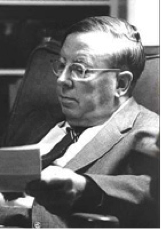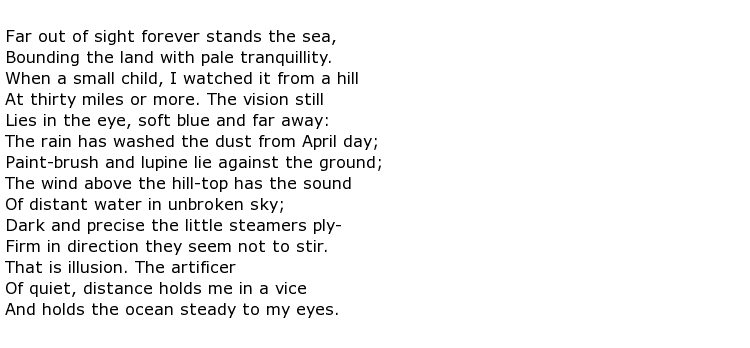 Yvor Winters was a 20th century American poet who favoured an experimental style of writing which did not always endear him to his peers. Some pieces consisted of one line and he varied his work from the more formal style to including imagist sections. While teaching at Stanford University he fell out with the Head of the English Department, a man who cruelly described his work as “a disgrace to the Department”. He did not enjoy good health throughout his life and, as a young man, was confined to a sanatorium having contracted tuberculosis.
Yvor Winters was a 20th century American poet who favoured an experimental style of writing which did not always endear him to his peers. Some pieces consisted of one line and he varied his work from the more formal style to including imagist sections. While teaching at Stanford University he fell out with the Head of the English Department, a man who cruelly described his work as “a disgrace to the Department”. He did not enjoy good health throughout his life and, as a young man, was confined to a sanatorium having contracted tuberculosis.
He was born Arthur Yvor Winters in Chicago, Illinois on the 17th October 1900. The family moved to Eagle Rock, California and Winters eventually moved back east to attend the University of Chicago. There was a thriving literary circle there and he bounced ideas of people like Elizabeth Madox Roberts and Glenway Wescott. His studies were unfortunately curtailed when he was diagnosed with tuberculosis and he had to move to a sanatorium in Santa Fe, New Mexico. He was strong enough to write though and he wrote enough to fill his first two books, published in 1921 and 1922.
On being discharged from the medical facility he remained in New Mexico and took up teaching in coal mining towns such as Madrid and Cerillo and found this an eye opening experience. He encountered people that he had never seen before and, sometime later, he stated that:

Winters decided to resume his own education in 1925 by enrolling at the University of Colorado (Boulder). He read Romance languages and obtained both bachelors’ and masters’ degrees. Going back to teaching again he met and married a fellow writer Janet Lewis in 1926. He was at Stanford University the following year and continued writing his own work as well writing critical pieces on other people’s writing. This was unusual in the 1930s and did not do his reputation much good, nor did it endear him to his colleagues. As he was also writing in experimental forms he was seen as a very peculiar sort.
He wrote a very harsh review of The Bridge in Poetry by Hart Crane who, nevertheless, responded to this with a “dazzling reply”. The English writer D H Lawrence had said that “much of American literature was heavily burdened with a self-indulgent romanticism” and Winters subscribed to this view. Oddly enough though a lot of material produced by Winters suggested that he could easily drift into that style himself. Take, for example, his poem The Slow Pacific Swell which eulogises the beauty and mystery of watching the sea from the shore. Here is the first verse:

As Winters grew older his own writing declined in volume and he concentrated his efforts on encouraging young poets at Stanford to write “within a scholarly program”. Such programs were rare in 1950s universities. He got a mixed reaction from students who passed through his hands. Some described him as overly autocratic while others praised him for his dedication and results.
His Collected Poems, published in 1961 won the Bollingen Prize for Poetry which was a belated award for a poet who had been writing for decades. His health problems were never far away though and he developed a throat cancer from which he never recovered.
Yvor Winters died on the 25th January 1968, aged 67.

